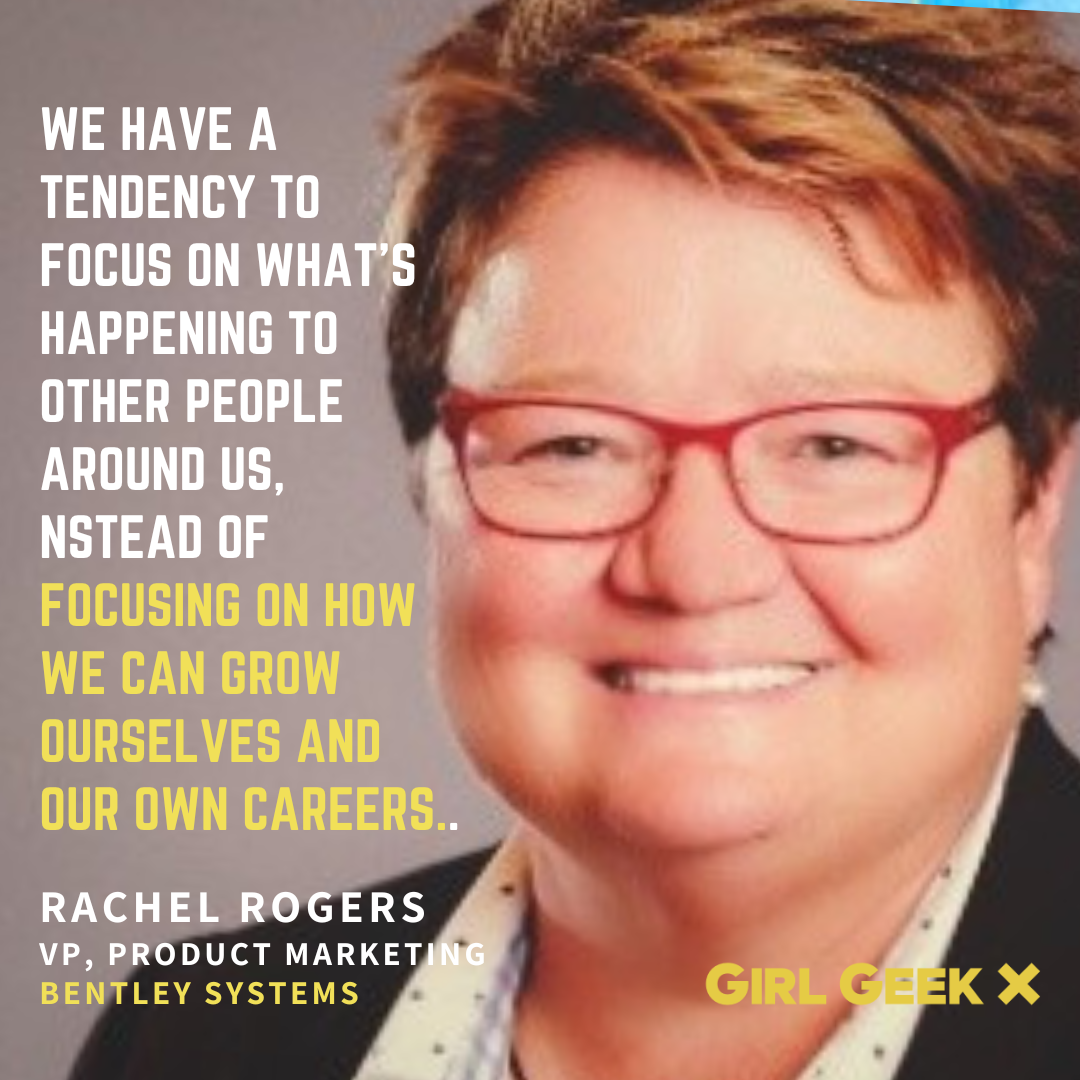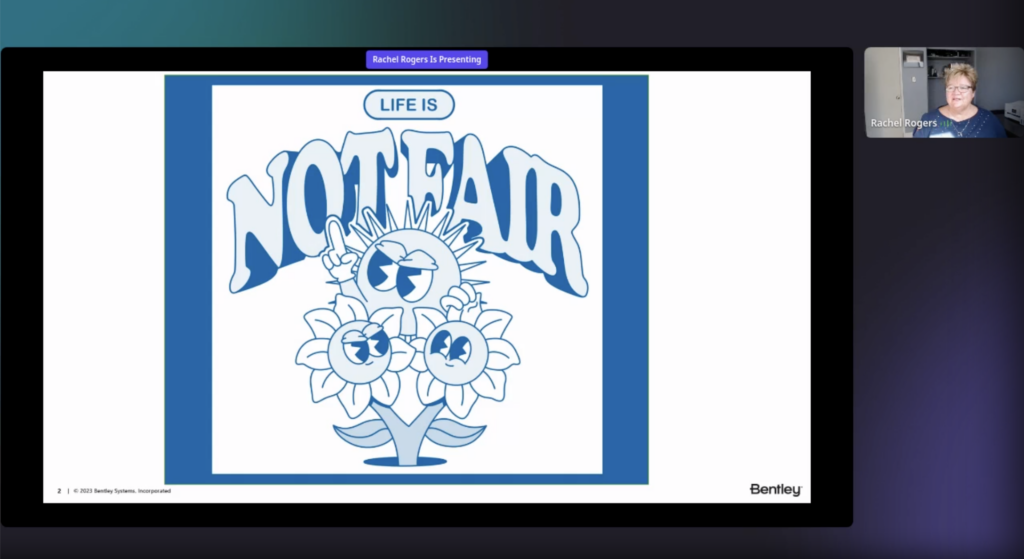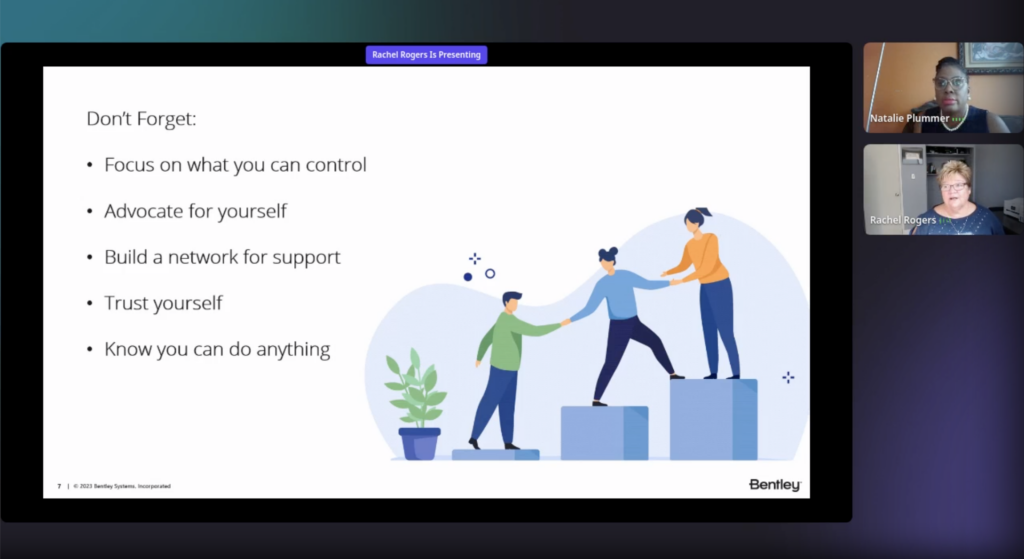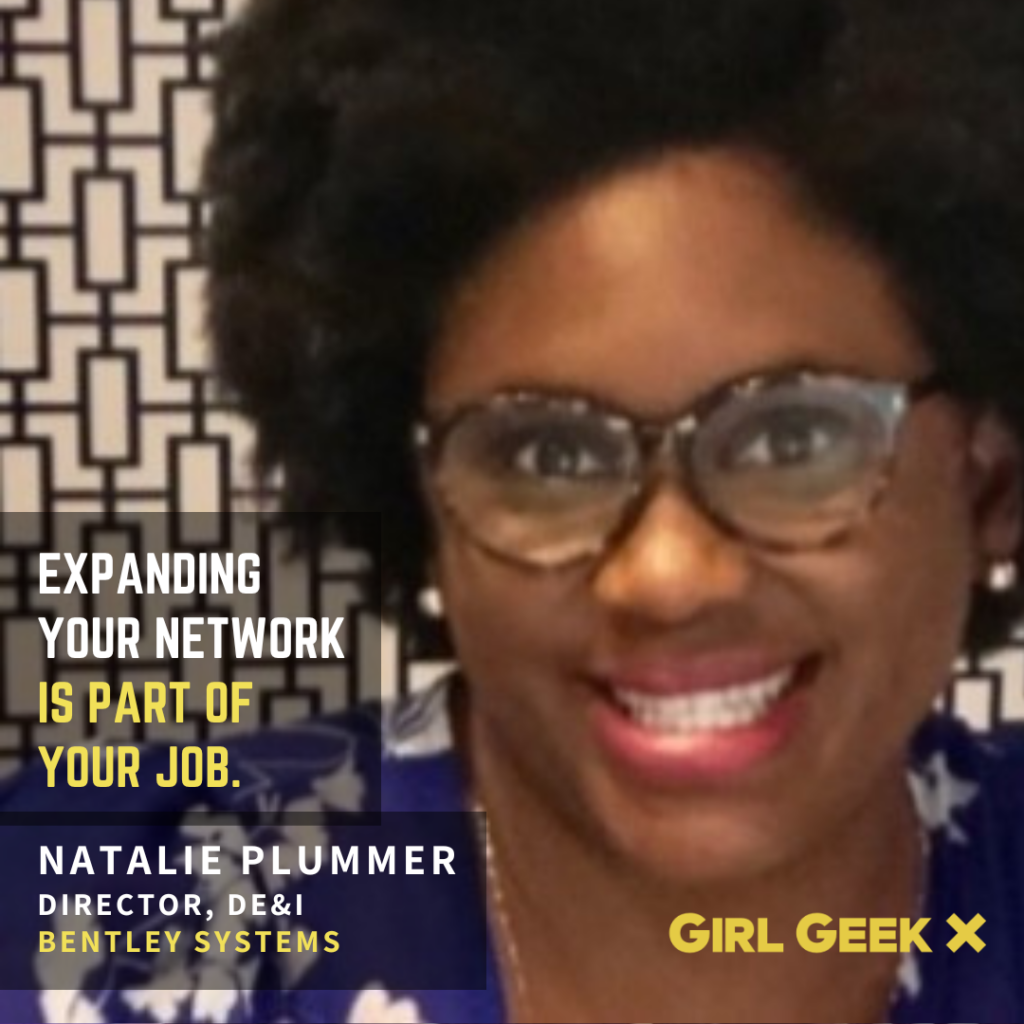VIDEO
Do you ever wonder how to advance your career, what is your colleague’s secret to success, or how you can make more of an impact at work? Rachel Rogers (VP of Product & Industry Marketing at Bentley Systems) will share some of the best advice she has received from others as well as her own learnings while growing her 30-year career in infrastructure software. If you want to hear real talk on growing yourself and your career, this is the session for you. Natalie Plummer (Director of Diversity, Equity & Inclusion at Bentley Systems) will be fielding audience questions with Rachel.
Like what you see here? Our mission-aligned Girl Geek X partners are hiring!
- Check out open jobs at our trusted partner companies.
- Watch all ELEVATE 2023 conference video replays!
- Does your company want to sponsor a Girl Geek Dinner or Career Fair? Talk to us!

Angie Chang: I’m the founder of Girl Geek X. With us today we have Rachel Rogers, who is the vice president of product marketing at Bentley Systems. She’s been at Bentley Systems for over a decade. Prior to Bentley was a director at Autodesk and Intergraph, where she began her career as a marketing writer. She has her BSBA from the University of Alabama and Huntsville. We have with us today as well, Natalie Plummer, the director of diversity, equity, and inclusion at Bentley Systems, who will be moderating the Q&A. Please pop your questions into the chat, Rachel and Natalie would love to answer them. Welcome, Rachel.
Rachel Rogers: Thank you so much, Angie. Good morning from sunny San Francisco Bay Area. It’s actually going to be a beautiful day today, and I’m excited to be here, and to share some of the best advice I’ve received. As Angie just said, I’ve been in this career for the last 30 years, over three decades, and I would like to share some of the best advice, and some of the things that I’ve learned myself through trial and error over those last three decades.
Rachel Rogers: As Angie just mentioned, to share a little bit about myself, I started my career at Intergraph in Huntsville, Alabama in the nineties as a marketing writer. Then I worked in the AEC division, which supported architecture, engineering, construction. Needless to say, at that time it was definitely a male-dominated team. In the mid two thousands, I moved across country from Huntsville to the Bay Area and worked at another CAD company, Autodesk, but this time on the sales side, to really help balance out my career and learn a different aspect of the business.
Rachel Rogers: This time I was one of a handful of women on the team that supported the infrastructure division and software industry. 11 years ago I joined Bentley, the third leading infrastructure software company in the world. We’re not the third, we’re one of the major ones, but I’ve always been in infrastructure. And I’ve worked from home for the last decade leading a global team, and I’m happy to report that now I work with so many talented, exceptional women, but we’re still in a male-dominated tech field. All of these adventures over the last 30 years have really led me to where I’m today.
Rachel Rogers: I hope that today I can share some of the insight that I’ve learned that’s going to be helpful for you. I’ve narrowed it down because, trust me, I’ve learned a lot in those three decades. I’ve narrowed it down, all that plethora of advice that I’ve received to what I think is the top five. Let’s get started with the countdown.

Rachel Rogers: Number five, or actually this could be number one too, but number five, life is not fair. I grew up in the deep south with a brother that was two years older than me. At that time, boys had the freedom to do almost anything they wanted, whereas girls did not. They could play sports, ride their bikes around the neighborhoods, stay out all day, disappear for hours without anybody know, avoid housework. You name it, they could get involved with it.
Rachel Rogers: I would often complain to my mother, “That is not fair.” And she would always say, “Who said life was fair?” It really pissed me off every single time, but she was right. As we always say, mothers are always right in the long run.
Rachel Rogers: Life is not fair, but even as adults, we can have a hard time not looking at others and not thinking that life isn’t fair. We have a tendency to focus on what’s happening to other people around us instead of focusing on how we can grow ourselves and our own careers.
Rachel Rogers: Even today I often have, and throughout my management, I’ve always had conversations with team members discussing why other colleagues were promoted instead of them, or how was somebody else chosen to do that project instead of me? Why does that person have a higher title than I do when I have more years on the job? Or the title is different.
Rachel Rogers: It’s really easy to get caught up into that. Why not me? What is it about me? We cannot control what happens to other people unless we’re in charge of making those decisions. Then often, even when we are in charge of making them, we’re still doing things on the recommendations of the people above us.
Rachel Rogers: If you spend your time worrying about your colleague’s projects, their opportunities, their career instead of yourself and your own professional growth in career, chances are you’re always going to be frustrated. Now, I’m not saying it’s easy. I’m one of the first ones that have learned this lesson.
Rachel Rogers: A lot of things are out of our control in the corporate world. Things like teams being reorganized around you, other people being promoted, not knowing about new opportunities. It’s happened to me many times, and I know I’ve reacted badly several times myself, but the best advice that I’ve received over the years has been that opportunities may not happen for you at the same pace as others.
Rachel Rogers: We each have our own unique path, and that’s the only thing that we can influence. And once you realize that you can only influence what you can control, you’re in a better place. Like how you react to things going on around you, how you advocate for yourself, and how you focus on your own career to grow your own successes. Life may not be fair, but it can be a lot easier to deal with when we focus on ourselves and not others.
Rachel Rogers: Number four, because we’re going to do kind of a David Letterman count. So number four, find your voice. I just mentioned that you need to advocate for yourself to support your own career and find your own successes. Finding your voice can be really challenging as a woman in a male-dominated industry. Or even as a person that may not like to speak in front of others, or that may not be something they’re comfortable with.
Rachel Rogers: For many years, I was the only woman on all-male teams. Remember all those engineers I just talked about? I was also one of the youngest, most times. So I would get really frustrated over the fact that guys just simply had no problems just talking over me in meetings, not listening to my ideas, just shrugging it off. It truly was like that FedEx commercial from years ago where it’s an office setting.
Rachel Rogers: A woman says, “We can use FedEx for shipping to save money in our budget.” And no one listens to her. And then a man says the exact same thing and everybody says, “Oh my gosh, that’s an incredible idea.” They heard him, they didn’t hear her.
Rachel Rogers: It’s not as funny in real life as it is in that FedEx commercial. Not that it really was funny. But men are comfortable leading conversations and they really usually don’t have a problem interrupting. Whereas women are much less prone to doing so. We’re less prone to leading it, we’re less prone to interrupting conversation. We sit back and wait to be included, oftentimes.
Rachel Rogers: You can’t wait for someone to ask you for your opinion or share your ideas. You have to speak up. You have to find your voice. You have to learn to share your ideas and your opinions, and really establish yourself as a valuable member of the team.
Rachel Rogers: Once you build your own credibility and showcase your skills and knowledge, then people around you are going to start listening more. They’re going to start asking questions of you. And they’re going to want your opinion, and they’re going to see your value, so not only are you building your own confidence in what you have to offer, but you’re also building a really strong brand for yourself.
Rachel Rogers: Make sure that you share your successes, your wins, and not only to your team, but to your manager. It’s the only way to make sure that your contributions are going to be known across the organization. You’ve got to speak for yourself so that you know you’re being seen and heard.
Rachel Rogers: You’ve also got to let people know, you need to make sure that your managers and others know what your wishes are for your career. You’re responsible for your own career growth. Let’s make sure that people know what your wins are, and make sure people know, especially your management, where you want to go with your career. Advocate for yourself, find your own voice.
Rachel Rogers: Number three, building relationships. At the beginning of my career, I used to think that I would simply grow my career based on all my hard work, my successful projects, my proven leadership, my other contributions. I was really naive, because, hopefully this isn’t too old of a phrase, but if it takes a village to raise a child, it really takes a network in support of others to help your career.
Rachel Rogers: You need a team of people inside your own organization helping support you, and helping find opportunities for you to shine, to grow, to build your own career. It’s difficult to do that just by yourself as a solo-person. You need to have that network supporting you, but building a network doesn’t just happen. I mean, you really have to invest the time and effort into connecting with people and nurturing your network. It’s difficult. It takes time.
Rachel Rogers: Your network, it can include a lot of people, like your current colleagues, past colleagues, managers, even managers from other companies you continue to stay connected to, industry groups that we can connect to, and a variety of social platforms now, alumni, other online connections. All these things are really important. These groups of people can really help pull together to help progress your career, let you know about new career opportunities within your company.
Rachel Rogers: They can help be influential in your own promotions or opportunities, new opportunities for you. And really help provide insight and support when you need it. Remember to invest the time in building them. It’s really easy to get caught up in, and I’m guilty of this as well. We get caught up in our daily job, all the urgent tasks, but we need to find the time to build those relationships so we have a support system in place when we need it.
Rachel Rogers: Remember, build your network, but just as another critical, find a mentor or a coach to help guide you. Look around your own organization, reach out to somebody you admire and ask if they have time to mentor you. I found that most people really are willing to help and invest time into giving back. I know that I really enjoy mentoring others and giving back, and for the most part others do as well. Find a mentor, it’s really going to be helpful in your career.
Rachel Rogers: Number two, and one of my personal mantras, is trust your instincts. Listen to your gut or your intuition. It’s telling you the right thing to do. Another lesson I’ve learned over the years is when I ignore that voice inside of me, things do not go well. I have so many examples of ignoring my intuition, and trusting other people’s opinion, and it not working out well for me or for my team.
Rachel Rogers: Perfect example is, years ago, we needed to hire a new product manager for the team. And even though the position was several layers below mine, I always like to interview candidates at the end to make sure that not only do they have the skills, but will they be a good fit for the overall team?
Rachel Rogers: Several colleagues and the manager interviewed the candidate. Everybody thought they had the right skills, they had the knowledge, they had the experience in the industry, they thought they would be really successful in the position. That person bubbled up to the top. I talked to them, but after I interviewed them, I really didn’t think that they were going to be a good fit personality-wise, and I thought that it could have a negative impact over the overall health of the team, but I wanted to support the manager and the team that interviewed them, so I ignored my gut and we made an offer and hired the person.
Rachel Rogers: Well, six months later, it was clear that the new colleague was very disruptive to the team. Production was down, frustration was really high, and then I had to handle the situation. It could have all been avoided if I just trusted my instinct. That little voice inside of you knows what’s best for you, learn to listen to it and to trust yourself. You know what’s best for you.
Rachel Rogers: Number one, and the most important of all, know that you can do anything. After you’ve learned to trust yourself, your intuition, you need to realize that you can do anything. Early in my career when I doubted myself, I would tell myself over and over, you can do anything. It was my mantra. I wrote it down in meetings when I was unsure of myself. I would write it down in the notes I was taking, or doodling.
Rachel Rogers: When I would feel overwhelmed by new projects, or opportunities, or having to build new teams or new companies or all the things that you’re asked to do. When you start feeling intimidated and overwhelmed by new challenges, just tell yourself, I can do anything. Have faith and belief in yourself that that’s the first step to your success, is knowing that you can do it.
Rachel Rogers: It’s really easy to get caught up in that noise, that others are smarter than you, they’re more educated, they’re more whatever, but knowing that you can do anything helps put you at ease. It gives you that confidence. It’s your greatest gift to know that you’re in charge of your life, and you can accomplish anything. Keep telling yourself that over and over until you believe it, because you can. You can do anything.
Rachel Rogers: Don’t forget. Focus on what you can control. Advocate for yourself. Build that network for support. Trust yourself and the intuition, and keep telling yourself you can do anything.
Rachel Rogers: With that, I’d like to welcome Natalie Plummer. She’s our director of diversity, equity, and inclusion to join me. And we’ve got a couple of minutes that we can ask any questions that we may have.
Natalie Plummer: I think I’m just going to go through some of the things, the questions and some of the points you raised. People can continue to put questions in the chat. I’m kind of monitoring the chat to see any questions.
Natalie Plummer: Here’s a question I want to ask you. One of the things that you said is people need to build a network. Here’s my question and it has a bunch of sub-parts because I could pick your brain all day. How do you build that network? Is it a mentor? Is it through an advocate?
Natalie Plummer: There’s a difference, and does it matter whether that advocate or mentor is a man or a woman? And does it matter if they’re even in your field?
Rachel Rogers: Oh, that is a great question. A, I don’t think it does. Many good things. I do not think it does matter that it’s in your field. Honestly, think it’s better to not be in your field because you get a different perspective. Does it matter if it’s a male or a female? Absolutely not. What matters to me, it’s somebody you admire, that you will listen to, that they, you know, will have insight. So they’ve been through things. They can coach you, you can help learn from their wisdom.
Rachel Rogers: I do not think that you have to have a woman to help you. I mean, it’s great because they can understand a lot of things, but I’ve had a lot of great male mentors. It helps me. Of course I to, I didn’t have that many women around the first 15, 20 years, so, I did. I had a lot of great guys that helped advocate for my career and helped do things. I don’t think that that matters. I think it’s whoever you’re comfortable with.

Rachel Rogers: I do want to go back, and I think you said, what’s the difference? Your network, totally different from your coach or your mentor. And by the way, an executive coach, a great investment, one of the best things I’ve ever done. I think a mentor is great. That network is, the people that you’ve worked with, that you build, they’re all over so they can help you. Whether they’re in your current company or in other companies. Because those are the ones you’re going to look to when, maybe it’s time for you to start a new career.
Rachel Rogers: Maybe you’re looking for something else. Maybe you just want a new opportunity within your same company, but you don’t know where to start. You want to broaden, like I did. I went from always being in marketing to being to the sales side. Maybe you want to broaden your experience. Having that network will let you know new opportunities and help advise you and what’s the best direction to go,
Natalie Plummer: Then logistically, how do you go about doing it? Is it something you carve out time for at the end of your day every day? Is it a weekly event? Is it monthly? Is it going to networking events once a week? Is it going on LinkedIn and seeing people you admire, and reaching out from them? Logistically, how do you recommend it when you have a busy day and you have your life afterwards?
Rachel Rogers: I’ll have to say, I’m not the best at it. Because as I said, this was something that I learned. I was very naïve. I thought for years and years that everything’s just going to happen based on my contributions.
Rachel Rogers: I do think, yes, you have to make time for it. You do need to schedule as a part of your day. I mean the LinkedIn, the social, doing those kinds of things. Obviously you can do that after hours and be able to build your own network, but I think building your network within the company, absolutely.
Rachel Rogers: You need to schedule meetings with people. You need to ask if they have the time to chitchat with you, if they need to ask for their advice. People appreciate that too. I think making those connections, and building them and nurturing them, just like friendships, you have to nurture relationships with people.
Rachel Rogers: Having a relationship at work is not unlike having a relationship with friends, that you need to put the time in and nurture that relationship. I’m guilty of not doing that as well. We all get busy in all of our demands, and our tasks, and our deadlines. But we really need to do it. It’s going to make you feel better as well. You need that personal time. You need time to connect with people, and not just heads down doing your job.
Natalie Plummer: It’s almost part of your job, as far as just expanding your network. That’s part of it as well.
Rachel Rogers: It’s definitely part of your own personal growth. As we talked about before, one of the things that you really need to learn, and it’s hard to learn is that you’re responsible for your own career. We think that other people are, oh, I’m going to promote them, or I’m going to do that. I’m just going to sit.
Rachel Rogers: No, you have to advocate for that, and then building that network helps. Because then people know what you have accomplished, and what you’re able to do. You may have opportunities in other areas, that’s certainly happened for me. Someone else advocating for me in a totally different area because we had a relationship, or we’d work together, or they knew … I would’ve never done that if I hadn’t been volunteered for different teams, or done this or that, or reached out across organizations to build networks.
Rachel Rogers: That’s one way that you can help do that, is to definitely reach out in your own organization and talk to others.
Natalie Plummer: All right. Going on to your next slide, you mentioned trust your instincts. Now, if you’re a younger person coming into this field, or even if you’re a person who just doubts themselves a little bit, how do you know what’s your instincts versus what’s your fear? That kind of negative voice in your head?
Natalie Plummer: How do you distinguish between the two when you’re entering a new field and maybe you don’t trust yourself as much as you should?
Rachel Rogers: I think that’s a good question. We’re now at 10:20, so I don’t know if Angie, if we’re out of time or if we can just … You definitely have to, that’s a great question, about learning to listen to yourself. Not listening to the negative thoughts, but listening to the positive thoughts and trusting your gut.
Rachel Rogers: It does take experience and time. I think that we’re out of time and I totally appreciate it. I can answer other things. And Angie, I just want to say thank you for giving us, Natalie and I have the opportunity to talk today.
Angie Chang: Thank you both for joining us today. I know we will see some of your faces at the virtual booth later, so everyone who has questions for them, please hang on to them and connect with them on LinkedIn and add in the virtual booth. See you in the next session. Thank you.
Natalie Plummer: Thank you so much.
Rachel Rogers: Thank you.
Like what you see here? Our mission-aligned Girl Geek X partners are hiring!
- Check out open jobs at our trusted partner companies.
- Watch all ELEVATE 2023 conference video replays!
- Does your company want to sponsor a Girl Geek Dinner or Career Fair? Talk to us!



